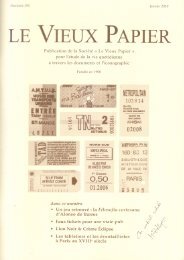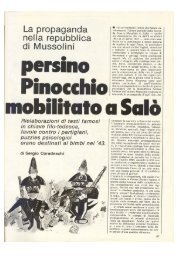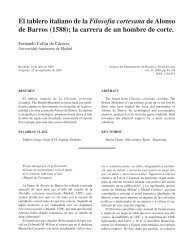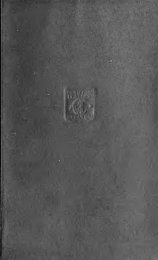Board games from the city of Vijayanagara (Hampi ... - Gioco dell'Oca.
Board games from the city of Vijayanagara (Hampi ... - Gioco dell'Oca.
Board games from the city of Vijayanagara (Hampi ... - Gioco dell'Oca.
Create successful ePaper yourself
Turn your PDF publications into a flip-book with our unique Google optimized e-Paper software.
B OOK R EVIEWS / COMPTES RENDUS / REZENSIONEN 121<br />
Mattel, more than twenty-five years <strong>of</strong> <strong>the</strong> Players, Inc. publication, now called Scrabble<br />
News, to “fill in blanks” in <strong>the</strong> history <strong>of</strong> tournament play, popular press articles on living<br />
room and tournament Scrabble culture, many works on word play and lexicography,<br />
and a handful <strong>of</strong> scientific volumes: K. Anders Ericsson, ed., The Road to Excellence: The<br />
Acquisition <strong>of</strong> Expert Performance in <strong>the</strong> Arts and Sciences, Sports, and Games (Mahwah,<br />
N.J.: Lawrence Erlbaum Associates, 1996), David Levy, Chess and Computers (Potomac,<br />
Mo.: Computer Science Press, 1976), and Larry R. Squire and Eric R. Kandel, Memory:<br />
From Mind to Molecules (New York: Scientific American Library, 1999). Sports and<br />
sport-like <strong>games</strong> are probably just as important to Fatsis’s preparation, in works like<br />
Alexander Cockburn’s controversial essay on obsession among chessmasters, Idle Passion:<br />
Chess and <strong>the</strong> Dance <strong>of</strong> Death (New York: Village Voice/Simon and Schuster, 1974),<br />
which Fatsis cites (p. 296), David Spanier’s more even-handed account <strong>of</strong> chess as sport,<br />
Total Chess (New York: Dutton, 1984), which Fatsis does not cite, <strong>the</strong> classic Paper Lion,<br />
and Fatsis’s own Wild and Outside: How a Renegade Minor League Revived <strong>the</strong> Spirit <strong>of</strong><br />
Baseball in America’s Heartland (New York: Walker & Co., 1995). Susan Orlean’s recent<br />
acclaimed report <strong>of</strong> obsession among Florida orchid fanciers, The Orchid Thief (New<br />
York: Random House, 1998), in superimposing moral questions onto a technical superstructure<br />
that is in turn embedded in a firsthand narrative, most resembles <strong>the</strong> book<br />
that Fatsis has wanted to write. (Though Orlean was never hooked on orchids.)<br />
Aside <strong>from</strong> board war<strong>games</strong>, miniatures war<strong>games</strong>, and role-playing <strong>games</strong>, only a<br />
handful <strong>of</strong> proprietary <strong>games</strong> have ever enjoyed anything like a “technical” (American)<br />
literature: Teeko (by John Scarne), Camelot, Monopoly, Scrabble, Risk, Diplomacy,<br />
O<strong>the</strong>llo, Mastermind, Icehouse, and maybe a few o<strong>the</strong>rs, though websites are multiplying<br />
that number many times. Much <strong>of</strong> <strong>the</strong> Scrabble technique that Fatsis liberally distributes<br />
throughout <strong>the</strong> text he has borrowed <strong>from</strong> three newsletters <strong>from</strong> <strong>the</strong> 1990s –<br />
Nick Ballard’s Medleys, Jim Geary’s JG Newsletter, and Brian Sheppard’s Rack Your Brain,<br />
<strong>from</strong> a host <strong>of</strong> small-press and self-published word lists, and <strong>from</strong> <strong>the</strong> two best American<br />
how-to books: Joel Wapnick’s 1986 The Champion’s Strategy for Winning at Scrabble<br />
Brand Crossword Game, now available as <strong>the</strong> CD-ROM, A Champion’s Strategies<br />
(Montreal: Joel Wapnick, 1999), and Joe Edley’s and John D. Williams Jr.’s Everything<br />
Scrabble (New York: Pocket Books, 1994).<br />
But if Scrabble were just ano<strong>the</strong>r “packaged” game, as Fatsis calls it (p. 23), it would<br />
be incapable <strong>of</strong> sustaining <strong>the</strong> moral and emotional weight <strong>the</strong> author wants to lay on<br />
it. A trademark is almost a metaphysical barrier: “Scrabble isn’t like any <strong>of</strong> <strong>the</strong> o<strong>the</strong>r<br />
thinking-person’s board <strong>games</strong>, for one reason: Someone owns it. Chess and backgammon,<br />
which have been played and studied for centuries, are non-proprietary. Anyone can<br />
make a copy. As such, <strong>the</strong>re’s a sort <strong>of</strong> <strong>the</strong>ological purity about <strong>the</strong>m, as if <strong>the</strong>y were<br />
handed down <strong>from</strong> <strong>the</strong> gods for humankind’s analysis and bemusement” (p. 22).<br />
Scrabble seems tainted by <strong>the</strong> o<strong>the</strong>r, lesser <strong>games</strong> in <strong>the</strong> Hasbro line: “[I]t isn’t a board<br />
game at all in <strong>the</strong> way that Clue or Monopoly is a board game, contrived, redundant, and<br />
temporal, but ra<strong>the</strong>r a brilliant, organic, seemingly inevitable creation in <strong>the</strong> same way<br />
as chess or backgammon or <strong>the</strong> Mona Lisa” (p. 178).<br />
The most telling comparison is with sports: “Perfection isn’t arrived at overnight,







